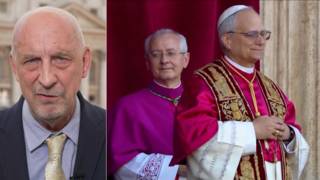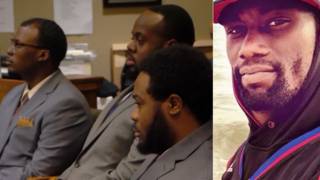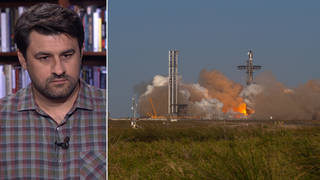
The Supreme Court’s conservative majority has ordered the Biden administration to continue enforcing Title 42, blocking asylum seekers at the U.S.-Mexico border. The Trump-era pandemic policy Title 42 has been used to expel over 2 million people at the border since March 2020. The court is preparing to hear oral arguments in February by mostly Republican-led states who are challenging Biden’s push to end the policy, while hundreds of migrants face freezing cold temperatures in camps along the U.S.-Mexico border. We speak to Luis Chaparro, a journalist reporting from the U.S.-Mexico border, about the fight to put an end to Title 42, and how gangs in Mexico have pivoted much of their operations to human smuggling as the policy drags on.
Transcript
AMY GOODMAN: Hundreds of migrants facing freezing cold temperatures in camps along the U.S.-Mexico border were among those closely watching a decision by the Supreme Court Tuesday on whether it would halt the Trump-era Title 42 pandemic policy, which has been used to expel over 2 million people at the border since March 2020, blocking them from seeking asylum.
FRANYER CHAVEZ: [translated] I would like to spend Christmas in a place where it is not cold. I would really like to have shelter, just as everyone here would like to spend Christmas under a roof, because the cold is strong.
AMY GOODMAN: But on Tuesday, the U.S. Supreme Court ordered the Biden administration to continue enforcing Title 42 while it prepares to hear oral arguments in February by 19 mostly Republican-led states who are challenging Biden’s push to end the policy. This is an asylum seeker from Venezuela responding to the news.
ASYLUM SEEKER: [translated] This feels like a bucket of cold water. We don’t know what to do now. We were told Title 42 has been prolonged.
AMY GOODMAN: Conservative Supreme Court Justice Neil Gorsuch sided with the three liberal justices in objecting to the ruling, with Justice Ketanji Brown Jackson and Gorsuch writing, quote, “The current border crisis is not a COVID crisis. And courts should not be in the business of perpetuating administrative edicts designed for one emergency only because elected officials have failed to address a different emergency,” unquote.
White House Press Secretary Karine Jean-Pierre said the Biden administration will continue to enforce Title 42, but called it, quote, “a public health measure, not an immigration enforcement measure,” and said it, quote, “should not be extended indefinitely.”
For more, we go to El Paso, Texas, to speak with Luis Chaparro, journalist reporting from the U.S.-Mexico border. His latest Vice News article is headlined “Migrants Surging to the Border 'Pray to God' for End of Title 42.”
Luis, welcome back to Democracy Now! On this day after the Supreme Court ruling, can you talk about what’s happening on both sides of the border? You’ve been — of course, you’re in El Paso, and in Ciudad Juárez.
LUIS CHAPARRO: Hi, Amy. Hi, Juan. Thank you for having me.
And, yes, I mean, unfortunately, the U.S. Supreme Court decided to keep in place Title 42. And I say “unfortunately” for tens of thousands of migrants stuck in Mexico. And, I mean, this news came as a bucket of ice water for them. They’ve been waiting since December 21st for the Title 42 to end, as they were told, and then they still had to wait for another week just to learn that Title 42 is going to keep in place, and they have, really, no plan.
In Ciudad Juárez, we’re talking about like more than 25,000 migrants, some of them sleeping in shelters, but not all of them have places in Ciudad Juárez shelters, so many are literally sleeping by the banks of the Rio Grande. And in El Paso, the city is also overwhelmed by those who are waiting to be processed under their asylum-seeking process. And many also, hundreds, are sleeping in the streets. And it’s freezing outside here in the El Paso-Ciudad Juárez border.
JUAN GONZÁLEZ: And, Luis, I wanted to ask you — we keep hearing the reports of this unprecedented surge of people trying to cross the border. But how much of this is actually the same individuals trying several times, or even dozens of times, to cross the border and being caught and being sent back again? And how much of it is also just the fact that the border has been effectively closed now for going on two years?
LUIS CHAPARRO: Yes. I mean, to be perfectly honest, Title 42 is creating a harsh situation at the border. It’s not really that many of them are trying over and over to get across, although some are some that are trying at least two times to get across to hand themselves over to Border Patrol and then request for political asylum. The real situation down here is that Title 42 is creating like a blockage for all of them, so they are tens of thousands of migrants confused, forming lines along the U.S. border wall to wait to be processed by U.S. Border Patrol.
The vast majority are not coming from Venezuela, because the Venezuelans know that they are — they don’t hold any chance to stay in the U.S. to properly ask for political asylum. So, it’s really sad to see most Venezuelans staying in the Mexican side just watching other migrants from places like El Salvador, Honduras, Guatemala reaching out to Border Patrol agents and actually being processed, while Venezuelans are immediately expelled back to Mexico under Title 42. And what I see immediately, it’s like three hours after they get across and processed, they are back in Mexico.
And this is also creating another situation. This is a dream for smugglers and drug cartels in Mexico, because they know many of them are going to get tired of waiting. They are disappointed and desperate, and they’re going to go after them to be smuggled in.
JUAN GONZÁLEZ: And could you expand on that, the role of the Mexican cartels and human smuggling groups taking advantage of the current situation?
LUIS CHAPARRO: Definitely. Drug cartels in Mexico, particularly in Ciudad Juárez, have been preying on migrants since at least last year. They know that they can make a lot of money. I recently interviewed one of the smugglers working for the Juárez Cartel, the local cartel here in Ciudad Juárez. And what he said was that right now a migrant — and this is, I’m quoting him — “a migrant worth more than a kilo of cocaine.” So, this is — I mean, this is how they’re looking at migrants in Mexico: as merchandise. Right?
And they know that if the border is actually blocked, if the border is actually closed for asylum seekers — because we have to remember that these are not migrants trying to unlawfully reach out to the U.S.; these are asylum seekers looking to enter lawfully into the U.S. under the political asylum policies. If they are blocked from doing that, they’re desperate to get away from danger that they’re facing in their countries, and they know that most of their countries can reach out to them in Mexico. So, many of them — I interviewed about like 20, 25 people last week in Ciudad Juárez, and literally half of them said that they were thinking on maybe staying in Mexico if Title 42 was blocked, and the other half was actually thinking of handing themselves to smugglers to be smuggled into the U.S.
AMY GOODMAN: Luis, on Saturday, you tweeted, “Its 20 degrees outside and hundreds of migrants who entered the country without being processed by Border Patrol are not being allowed in El Paso shelters that receive federal funding. The 'solution' city officials are offering is to 'connect' them to Border Patrol authorities to be processed, but that means that they will get expelled immediately under Title 42.” Can you elaborate on that?
LUIS CHAPARRO: Yes, exactly. That was a really sad situation to learn from the migrants already here in El Paso. Many of them who didn’t turn themselves in to the Border Patrol authorities and who actually made their journey to the U.S. unlawfully by crossing the river or jumping the border wall, and that they ended up in the streets of El Paso during these freezing temperatures all over this week, they have no place to go, because the shelters that are receiving funds from the federal government are not taking them in, fearing that they will lose that federal funding. And many of the other shelters, like churches or shelters privately run, are overwhelmed. They have no more place for all of them. So they have to sleep on the streets.
And the city is providing them with an answer, which is basically, “Go and turn yourself to the Border Patrol so they can process you.” But that means that they will be immediately deported back to Mexico, back to where they started. And, I mean, they paid probably around $10,000 U.S. to be smuggled in.
JUAN GONZÁLEZ: And, Luis Chaparro, could you talk about the sudden rise in the last year or so of asylum seekers from Nicaragua at the border? Generally speaking, those who have come in previous years were from Honduras, El Salvador, Guatemala. And we’ve heard about the Venezuelan surge, but now, suddenly, Nicaraguans, as well. Can you talk about how they’re being received at the border?
LUIS CHAPARRO: Yeah, definitely. As we know, Latin America — many Latin American countries are facing difficult situations, a difficult reality right now, including Venezuela and Nicaragua. Many of the Nicaraguans getting to the border are being processed. And I’ve interviewed many of them also in the streets of El Paso. They are — at least half of them are going to receive — it’s still confusing, who are qualifying to get received under political asylum process and who of them are actually turned back into Mexico. The ones that are already here in El Paso are telling me that at least they are here, they feel safe, but they — literally, they say — and I’m quoting them — “The nightmare didn’t end when I crossed the border,” because they still received a bunch of insults and racism by border authorities while getting hold on ICE facilities. And it is until now that they feel a bit more of a relief while they are in El Paso, but they are also clueless on where to go, because many of them don’t have anyone to receive them in the U.S.
AMY GOODMAN: In the case of, for example, Venezuela and Cuba increase of immigrants coming over the border, do they at all discuss U.S. sanctions imposed against their country, putting a stranglehold on the economy, as well?
LUIS CHAPARRO: Yes, exactly. Most of them — I mean, most of them are running from a situation that was originated, of course, by the U.S. policies against their own countries. The people from Venezuela, they’re fleeing from starving in their own country. They’re fleeing from gangs. They’re fleeing from government policies — as well as Nicaraguans. A couple of Nicaraguans I interviewed is a father and an 11-year-old kid who went out to the streets to protest against the government, and he, the father, was taken by the police. He was tortured inside official facilities, until he was let out because of his medical situation. He was badly hurt. And he decided that he needed to leave, because he knew that he was going to get killed by the military in Nicaragua. So now he’s here.
But Venezuelans are facing a different situation. There are no diplomatic relationships between the U.S. and Venezuela. So, if they’re fleeing their country for being a target of their own government, which will apply under the political asylum policies, they cannot be turned back to their countries of origin. And so, that’s what they’re — they’re going to have to stay in Mexico under Title 42. They are not allowed in the U.S. They have to wait for the process in Mexican soil.
AMY GOODMAN: And very quickly, Luis, we last talked to you when you followed a bus sent by the Texas governor to Washington, D.C., as a kind of publicity stunt. It happened again this week, when Governor Abbott sent a busload of immigrants and dropped them off in front of the official residence of the vice president, Kamala Harris, at the Naval Observatory in Washington, D.C. I think it was something like 18 degrees. Can you talk about this?
LUIS CHAPARRO: Yes, definitely. I mean, the migrants are still being used as props on a legal fight between Democrats and Republicans. This group of migrants were sent out now to a place that they don’t know. They have no clue where they’re going. And this is completely abusive against migrants.
The last time we spoke, I followed this bus that was sent from El Paso to New York. And most of the migrants didn’t even want to go to New York. Many of them were dropping off the bus along the way in places that they didn’t even know where they were. This woman was going to Dallas, and she — I mean, to Miami, and she jumped out in Dallas. It was obviously a long way to go. Some others jumped off in Tennessee.
So, I mean, they’re still — the U.S. policymakers are still using them as props and sending them to places they either don’t want to be or they have no clue that they’re going to show up there. And this is a publicity stunt to — maybe to stop them from getting here, but also to make a point against Democrat-led states.
AMY GOODMAN: Well, Luis Chaparro, we want to thank you for being with us, journalist reporting from the U.S.-Mexico border. We’re going to link to your Vice News article, “Migrants Surging to the Border 'Pray to God' for End of Title 42.”
Next up, we go to Buffalo, New York, which is experiencing a Katrina moment after this weekend’s historic blizzard, the death toll over 31 at this point, as people froze to death in their homes and cars. Stay with us.












Media Options